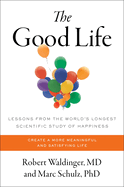
In The Good Life: Lessons from the World's Longest Scientific Study of Happiness, authors Robert Waldinger and Marc Schulz share a valuable trove of narrative data on that most elusive of human quests: understanding what it takes to craft a meaningful and fulfilling life, despite the trials and tribulations that are an inevitable part of the human experience. Although American culture brims with assumptions on what a good life looks like, factoring in money and status, the authors' findings, "built on a bedrock of scientific research," guide readers towards a more wholesome, evidence-based truth: personal relationships are critical in that the frequency and quality of our contact with other people are two major predictors of happiness.
Waldinger and Schulz are the director and associate director, respectively, of the Harvard Study of Adult Development, a project launched in 1938 to understand what makes people thrive, and "the longest in-depth longitudinal study of human life ever done." Acknowledging the limitations of research originally based on white male Bostonians, the authors meticulously cross-referenced their data with racially and geographically diverse longitudinal studies. Study after study, they conclude, reinforces the connection between good relationships and health, regardless of a person's location, age, ethnicity or background.
Readers intrigued by Waldinger and Schulz's findings will appreciate the actionable advice they share, and the good news that approximately 40% of our happiness is within our control through our efforts and the choices we make. It is never too late to build relationships, the engine of a good life being not the self but rather our connection to others. --Shahina Piyarali, reviewer

